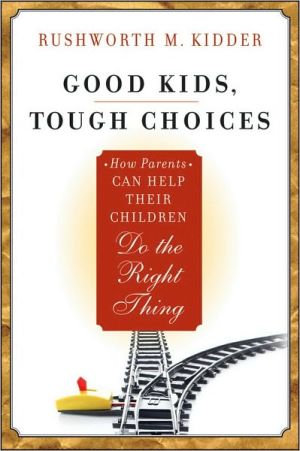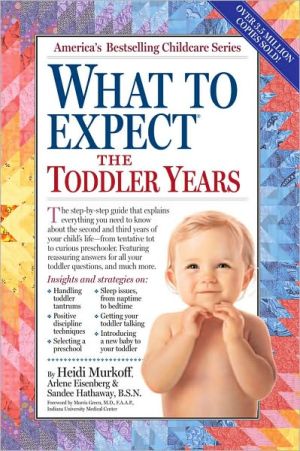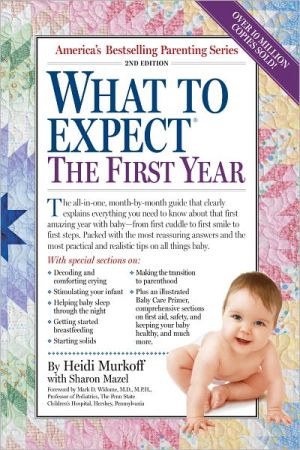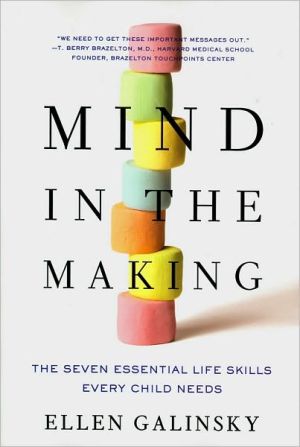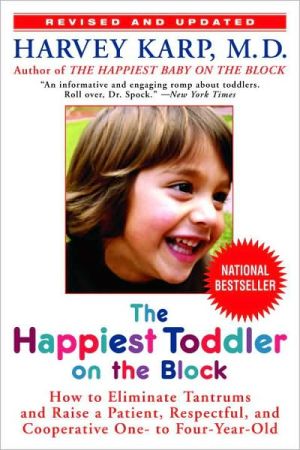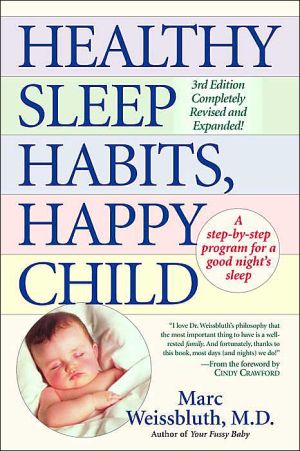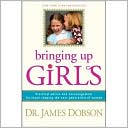Good Kids, Tough Choices: How Parents Can Help Their Children Do the Right Thing
A practical analysis and inspiring guide for teaching kids "ethical fitness"\ Parents are beginning to realize that deficiencies in ethics and character are becoming a big problem among our nation's children. According to the latest data, lying, cheating, and rampant insensitivity to other people are increasingly common. What can parents do? In this book, ethics expert Rushworth Kidder shows how to customize interventions to a child's age and temperament. He encourages parents not to give up,...
Search in google:
Praise for Good Kids,Tough Choices"Rush Kidder's Good Kids, Tough Choices is great for every parent who wants practical advice about how to raise kids with good character who do the right thing. He doesn't offer platitudes or one size to fit all, but he shows how to approach every moral question in the context of the individual situation. Rush has done his homework and has the research to prove it, from his own studies all over the world."—Michele Borbaauthor, Building Moral Intelligence and The Big Book of Parenting Solutions; parenting expert for the Today show"Rush Kidder's brilliant tool for the twenty-first-century family will benefit parents who want their children to develop ethical fitness. It's a must-read for every family."—Rear Admiral Barry C. Black (Ret.)Chaplain of the United States Senate and former Navy Chief of Chaplains"I just loved this book, especially all the anecdotes and stories. [I] couldn't put it down. It's a lesson study illustrating vividly the moral dilemmas that parents and kids of all ages face daily, providing a beacon of light into the dark confusion over how to raise good kids."—Patrick F. Bassettpresident, National Association of Independent Schools"As they read Kidder's true stories illustrating ethical dilemmas kids face from toddlerhood into young adulthood, concerned parents will tell themselves, 'I can relate to that.' When they see how he parses each story's complex ethical issues and shows ways to apply abiding principles to these everyday situations at various stages of their children's lives, parents will say, 'We can model that and teach it to our kids!'"—Jim Rettig university librarian, Boatwright Memorial Library, University of Richmond; past president of the American Library Association Publishers Weekly Kidder (How Good People Make Tough Choices), founder and president of the Institute for Global Ethics, a nonprofit organization that promotes character and integrity in corporations and other groups, focuses on parenting issues in his latest volume on the subject of ethics. Kidder treats children from birth to age 23, with age-appropriate chapters that address such questions as how to respond when children lie or steal, how kids can overcome selfishness, and how to react when a child breaks school rules. Arguing that "ethical fitness" can be taught and requires the same kind of long-term commitment as physical fitness, Kidder considers common ethical challenges through the three "lenses" of knowing what's right, making tough choices, and standing for conscience. Using "extended narratives" developed from seminars and interviews, the author dissects a range of moral dilemmas and explains how, through discourse and conversation, modeling and mentoring, and practice and persistence, parents can help kids develop moral courage and make ethical decisions. Kidder maintains that good moral habits can be taught and developed when parents are willing to make a commitment to communicate and stay involved. (Oct.)
Acknowledgments. Introduction: Three Lenses for Ethical Parenting How to Use This Book. What If I Face Ethical Dilemmas of My Own? 1 Raising Kids in Today's Moral Environment. What the Research Tells Us. Why Parents Make a Difference. 2 Birth Through Age Four. Branson and the Gold Coins. Teaching Responsibility. Playing According to Your Own Rules. Loren Wrecks the Train. 3 Ages Five Through Nine. Teaching Thrift in an Age of Opulence. Teaching Ethics Through Principles. Ethics and Peer Pressure. 4 Ages Ten Through Fourteen. Resolving Ethical Dilemmas. Zero Tolerance. Avoiding Bystander Apathy. Showing Moral Courage. 5 Ages Fifteen Through Eighteen. Finding the Third Way. A Sexual Crisis. Caught Stealing. Confronting Parental Weakness. Explaining Divorce. 6 Ages Nineteen Through Twenty-Three. Counseling, Not Controlling. Supporting Your Daughter or Saving Your Grandchildren. The Difference Between Courage and Stubbornness. 7 Conclusion. How Emotion and Morality Interact. Using the Moral Toolkit. Top Ten Tips for Ethical Parenting. Notes. Glossary. Further Reading. About the Author. Questions for Discussion. Index.
\ Publishers WeeklyKidder (How Good People Make Tough Choices), founder and president of the Institute for Global Ethics, a nonprofit organization that promotes character and integrity in corporations and other groups, focuses on parenting issues in his latest volume on the subject of ethics. Kidder treats children from birth to age 23, with age-appropriate chapters that address such questions as how to respond when children lie or steal, how kids can overcome selfishness, and how to react when a child breaks school rules. Arguing that "ethical fitness" can be taught and requires the same kind of long-term commitment as physical fitness, Kidder considers common ethical challenges through the three "lenses" of knowing what's right, making tough choices, and standing for conscience. Using "extended narratives" developed from seminars and interviews, the author dissects a range of moral dilemmas and explains how, through discourse and conversation, modeling and mentoring, and practice and persistence, parents can help kids develop moral courage and make ethical decisions. Kidder maintains that good moral habits can be taught and developed when parents are willing to make a commitment to communicate and stay involved. (Oct.)\ \ \ \ \ Library Journal\ - BookSmack!\ Kidder, founder of the nonprofit and nonsectarian Institute for Global Ethics, here presents a combo of research and parenting tools for raising kids with strong moral convictions based on five shared values common to cultures around the world: honesty, responsibility, respect, fairness, and compassion. Organizing the book by age group (birth through 23), he shows parents how to navigate dilemmas and live by sound guidelines, arrive at wise decisions, and have the courage of conviction. These three lenses-core values in the early years, decision making in the middle years, and considerations of moral courage for the older set-are explored through realistic scenarios based on actual experiences and interviews with parents. This would pair nicely with Ian James Corlett's E Is for Ethics, which uses sample scenarios to help younger children develop an ethical compass, or The World Needs Your Kid (below). Recommended. Julianne J. Smith, "Parenting Short Takes", Booksmack!, 10/21/10\ \
